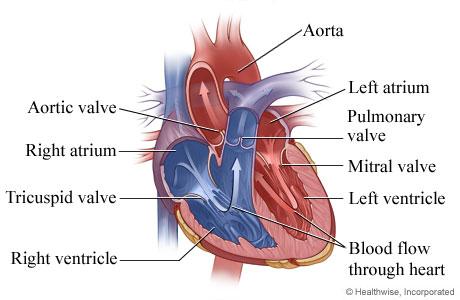
Your heart valves keep blood from flowing backward. Heart valve conditions can be present at birth, related to age or caused by another health condition.
Most patients with heart valve problems are concerned about the prospect of heart surgery. The Frankel Cardiovascular Center’s Comprehensive Heart Valve Program offers several minimally invasive and transcatheter options for valve repair and replacement.
Our world-renowned specialists work with you to identify the safest and most effective treatment option. We provide expert care to protect your health and help you feel better as quickly as possible.

Heart Valve Care: The Frankel Cardiovascular Center Distinction
Our program is designated by Newsweek as the 17th best specialized hospital for cardiology and cardiac surgery in the world. We are leaders in:
- Experience: We have decades of experience repairing and replacing valves. Our surgeons perform a high volume of procedures each year, resulting in excellent patient outcomes.
- Innovation: Heart valve treatments are evolving rapidly. Our specialists are at the forefront of clinical trials that provide novel, less invasive therapies not available at other centers.
- Specialization: We have all types of cardiovascular specialists on our team, including interventional cardiologists, cardiac surgeons and imaging experts that focus exclusively on heart valves.
- Multidisciplinary teams: You benefit from the collective expertise of cardiovascular surgeons, cardiologists, radiologists, anesthesiologists, nurse practitioners, nurse care coordinators and other staff. This team-based model enhances our ability to meet your needs.
- Individualized treatments: Our specialists work together to evaluate your condition. We then meet with you to discuss your treatment options and decide what’s right for you.
Patient-Centered Care
Within the Frankel Cardiovascular Center, we provide patient-centered care. We treat you how we’d treat our own family.
- Our care coordinators, nurse practitioners and physician assistants serve as your main points of contact. They are familiar faces that help guide you before, during and after your heart valve treatment.
- We encourage you to bring in a familiar person to provide support and ask questions. Having a companion helps you make decisions and reduces fear and anxiety.
- Our staff strives to always communicate clearly. We want you to understand your condition and treatment options so you can fully participate in your care.
- We invite our patients to serve as representatives on Frankel Cardiovascular Center committees. Patient representatives help us make decisions related to innovation, teaching and program development.
Heart Valve Disease
Heart valve conditions include regurgitation (leaky valve) and stenosis (narrowed valve). There are four valves in the heart that keep blood flowing in the right direction.

Aortic Valve
The aortic valve is the gatekeeper between the main pumping chamber of the heart (left ventricle) and the aorta. It has three leaflets and is located within the aortic root, the junction between the heart and aorta.
The aortic valve opens when the left ventricle contracts, allowing blood to flow into the aorta and to the rest of the body. When the left ventricle rests, the valve closes, preventing blood from flowing backward.
The most common condition of the aortic valve is aortic stenosis. Find out more about aortic valve disease.
Mitral Valve
The mitral valve controls blood flow between the upper and lower chambers of the left side of the heart (the atrium and ventricle). It has two leaflets supported by strong fibers (chords) and muscles.
When the left ventricle contracts, the valve closes to prevent blood from flowing back into the left atrium. The most common condition of the mitral valve is regurgitation.
Approximately 90% of patients with mitral valve conditions are treated for a leaky valve. Learn more about mitral valve disease.
Tricuspid Valve
The tricuspid valve separates the right atrium and right ventricle and controls the flow of blood from the body to the heart. It has 3 leaflets, and like the mitral valve, it has chords and muscles that provide support when the right ventricle contracts.
Conditions of the tricuspid valve are often associated with other heart and valve problems.
Pulmonary Valve
The pulmonary valve regulates blood flow from the right ventricle to the pulmonary artery, which carries blood to the lungs. Diseases of the pulmonary valve are relatively rare and most often present from birth.
Doctors at the Frankel Cardiovascular Center’s Adult Congenital Heart Disease Program provide expert treatment to adults with congenital conditions of the pulmonary heart valve.
Heart Valve Disease Treatment
We offer a range of treatments for heart valve disease:
- Nonsurgical treatments involve medication and lifestyle modifications to relieve symptoms and prevent further valve damage.
- Transcatheter-based approaches use catheters (thin tubes) that the doctor inserts into a blood vessel and guides to the heart. Catheters can also be inserted through a small incision in the chest.
- Minimally invasive surgery allows the surgeon to reach the heart through an incision between the ribs.
- Open-heart surgery requires the surgeon to open the chest cavity to access the heart.
See more about our innovative aortic valve treatments and procedures.
Explore our approaches to mitral valve repair and treatment.
Repeat Heart Valve Procedures
Sometimes mechanical valves wear out and need to be replaced again. Some patients have had an unsuccessful valve procedure performed elsewhere. Our doctors are experienced in unique treatment approaches, often minimally invasive or transcatheter, for patients with previous valve repair or replacement.
Make an Appointment
To schedule an evaluation with a Frankel Cardiovascular Center physician, call 888-287-1082. Or visit the Make a Cardiovascular Appointment page to learn what to expect when you call us.
Physicians: To refer a patient, call M-Line at 800-962-3555.

